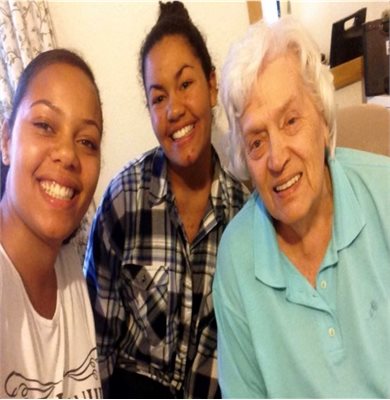Sepsis week at Northampton General Hospital- Brittani's Story

Brittani shares the story of her great grandmother
As part of sepsis week at Northampton General Hospital we spoke to our medical secretary Brittani who lost her great grandmother to sepsis earlier this year. Brittani and her family have used their experience to raise awareness of sepsis.
“My great grandma , known to many as Nanny Panter, was born in West Molesey, Surrey. She moved to Northampton many years ago where she brought up five children on her own after sadly losing her husband. She was a very hardworking lady who tried to maintain her independence as much as she could, even when her health started to deteriorate over the last 5-10 years. She always kept a smile on her face though and often boasted of her very large family consisting of grandchildren, great grandchildren and her first great-great grandson who was born in 2017.
Unfortunately over Christmas last year she wasn’t feeling quite herself. She developed a chesty cough and was generally feeling under the weather but didn’t want to make too much of a fuss about it. She had various family visitors who would keep an eye on her and received daily visits at home from community nurses who would wash and dress her diabetic leg ulcers.
Mid-January of this year she was admitted into hospital after the family and community nurses became increasingly concerned about her health. Once at NGH she was diagnosed with a leg infection, there wasn’t anything too abnormal about it and she began her recovery. After a week or so she decided enough was enough and discharged herself from hospital. I remember receiving a phone call from her asking if I would pick her up from the discharge lounge once I finished my shift. We knew she wasn’t quite right but she was a strong-willed woman and wanted to return home.
After returning home on Tuesday evening she had picked up by the Wednesday and seemed to be in good spirits; considering how unwell she had been, this was quite a surprise. Unfortunately by Thursday she was delirious, falling unconscious often, complaining she was cold and feeling nauseous which we now know are signs of sepsis. We rang 111 but despite their advice she was determined she didn’t want to go back to hospital - again an example of how strongwilled she was!
I stayed with her overnight and the nurses returned in the morning, I explained her symptoms and they were very concerned. They checked her observations and found her breathing was abnormal (another sign of sepsis) so they strongly advised she went to hospital, which she reluctantly agreed to.
She was admitted on Friday and by the following Thursday had severely deteriorated from what we thought was a bad leg infection. At this point it was identified that she had sepsis and despite best efforts of the medical staff, her body was not responding to the strongest antibiotic they could give.
In February after a strong fight Nanny Panter passed away aged 89 surrounded by her loved ones. She truly fought her way through but eventually was too poorly to continue. The support received from the team at NGH was fantastic; they were very patient despite the large numbers of us who wanted to by her side. There was a particular nurse on the emergency assessment unit who had looked after my nan on her first admission, so knew her well, and she made the effort to come over and say goodbye as she was finishing her shift which was really lovely.
Following our experience it got us thinking about sepsis and the fact none of us knew what to look out for (especially as the symptoms can be mistaken for the flu). We soon decided we wanted to raise awareness in our local community and turn our experience into an opportunity to educate others about sepsis.
My sister Luci and I decided to do a fundraiser for the Sepsis Trust. The event took place at the Bipin Brook community centre in August. It included support from the UK Sepsis Trust who provided us with literature and two sepsis volunteers (one being a sepsis survivor), as well as other business stalls and community organisations. We’ve raised £715 to date and it was a great way for us to remember our Nan and help the public to learn more about sepsis.
The link to the go fund me page is: uk.gofundme.com/vbmvz2-sepsis-awareness
We plan to close this page on 30th September so the fundraised amount can be forwarded directly to the UK Sepsis Trust.
Hopefully by raising awareness of the symptoms it can be identified earlier which is key to treating it.”
Sepsis is the immune system’s overreaction to an infection or injury. If you suspect someone has sepsis please seek medical help as soon as possible.
HOW TO SPOT SEPSIS IN ADULTS
Seek medical help urgently if you (or another adult) develop any of these signs:
- Slurred speech or confusion
- Extreme shivering or muscle pain
- Passing no urine (in a day)
- Severe breathlessness
- It feels like you’re going to die
- Skin mottled or discoloured
HOW TO SPOT SEPSIS IN CHILDREN
If your child is unwell with either a fever or very low temperature (or has had a fever in the last 24 hours), call 999 and just ask: could it be sepsis?
A child may have sepsis if he or she:
- Is breathing very fast
- Has a ‘fit’ or convulsion
- Looks mottled, bluish, or pale
- Has a rash that does not fade when you press it
- Is very lethargic or difficult to wake
- Feels abnormally cold to touch
A child under 5 may have sepsis if he or she:
- Is not feeding
- Is vomiting repeatedly
- Has not passed urine for 12 hours
For further support and advice on sepsis visit:
www.nhs.uk/conditions/sepsis
sepsistrust.org
Posted on Friday 14th September 2018